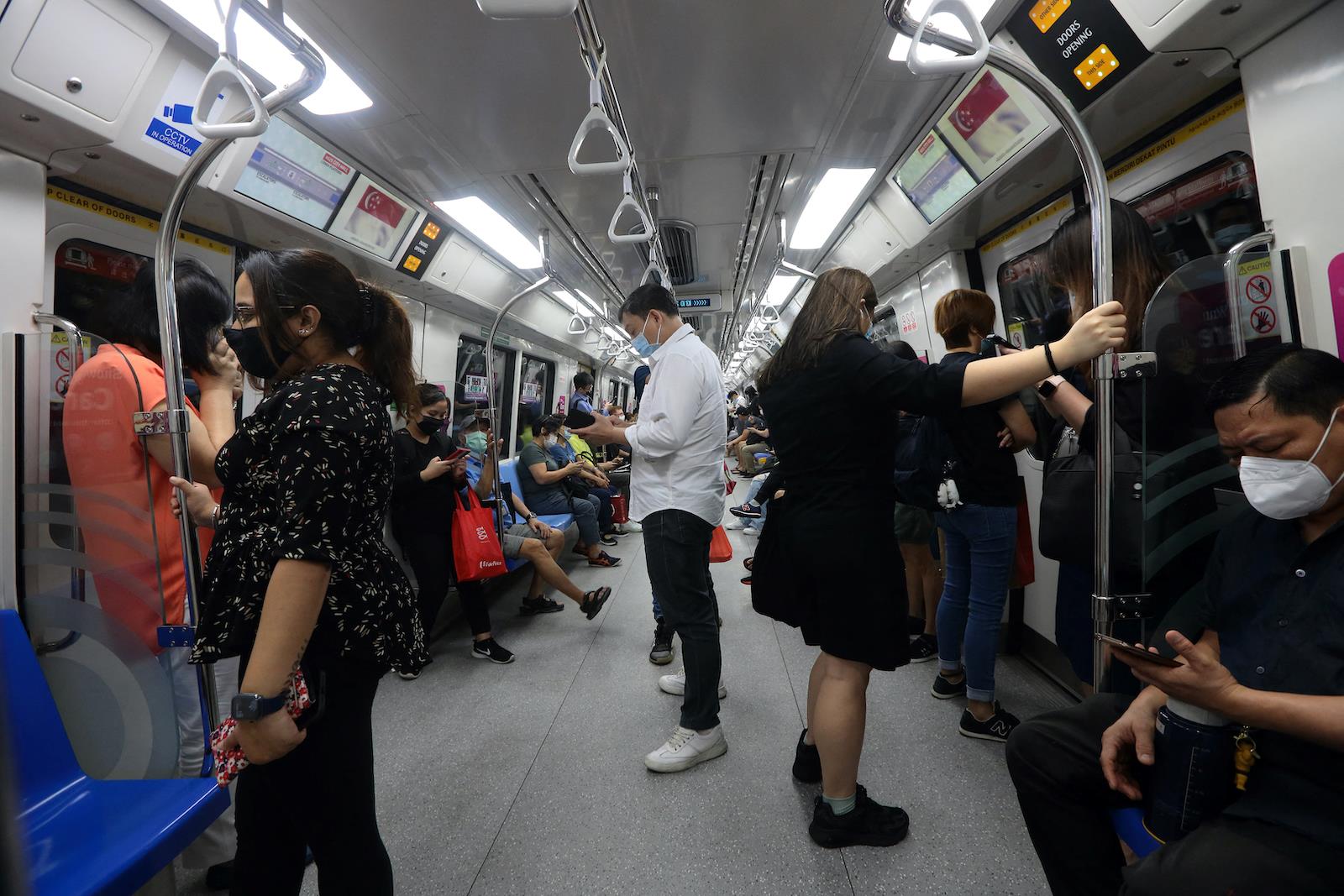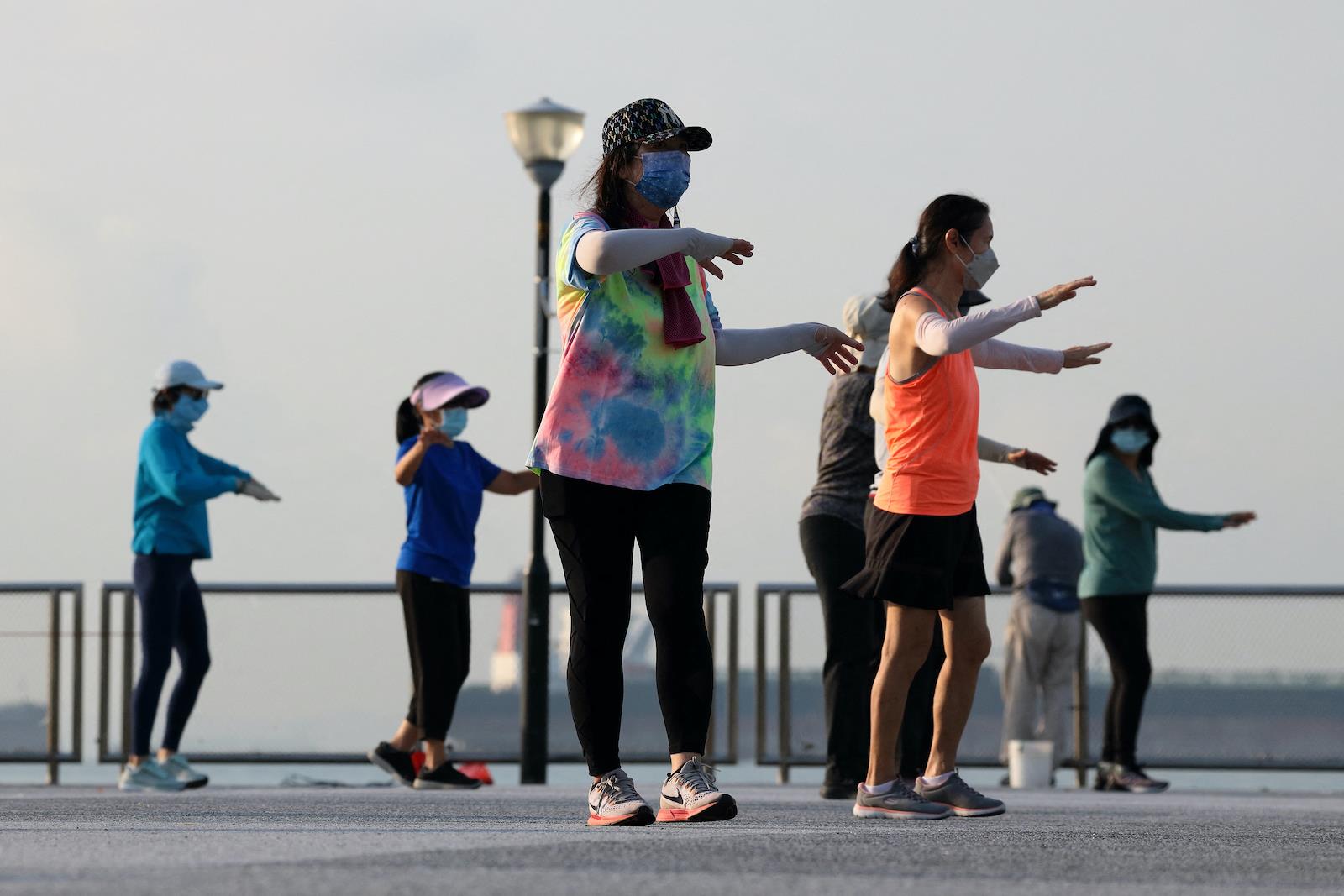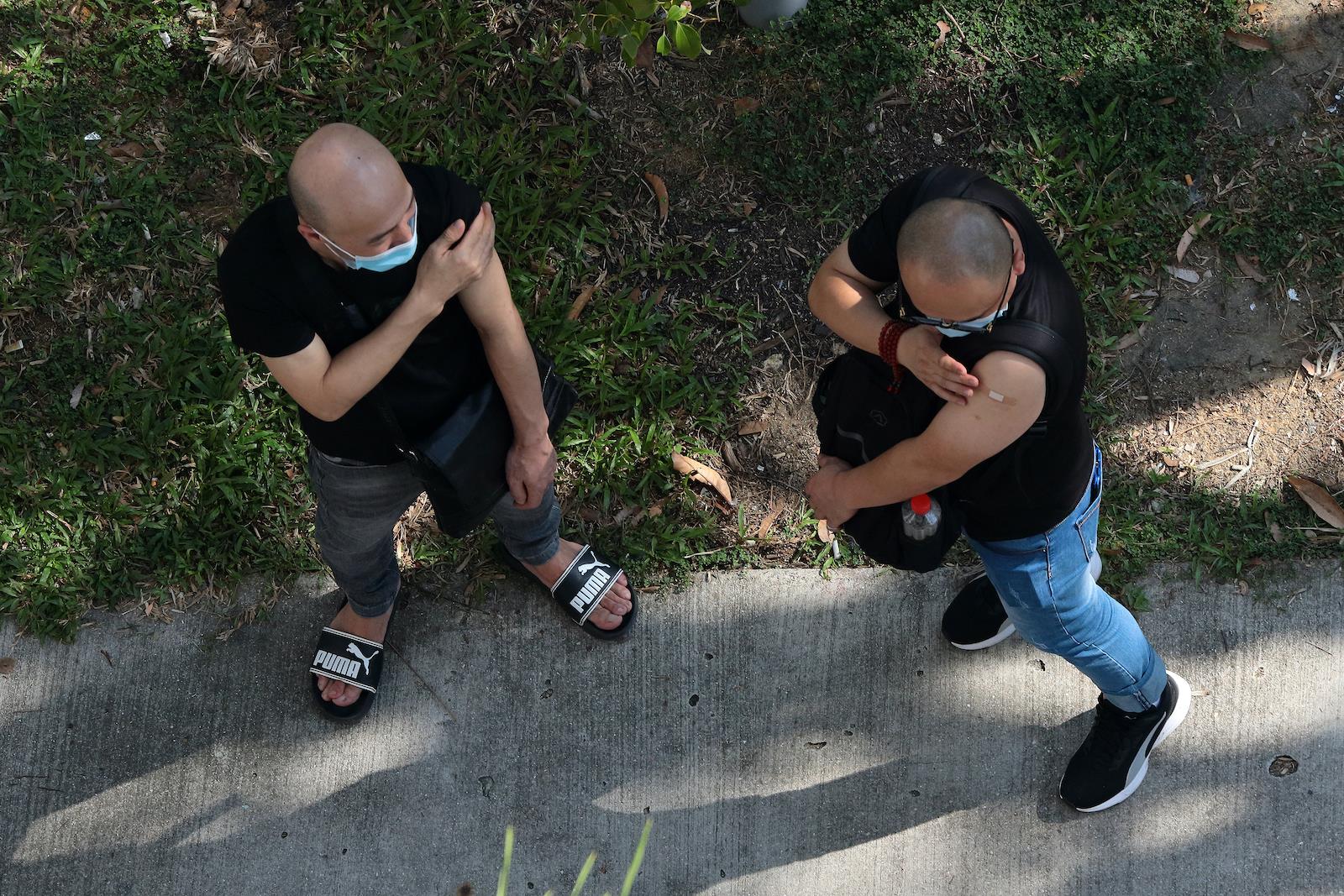
Singapore finding it hard to 'live with Covid'
(MENAFN- Asia Times) SINGAPORE – Singapore's“living with Covid” strategy is being tested by a record rise in new daily cases, laying bare the challenges of moving from pandemic to endemic. But health officials in the city-state, which at 82% boasts one of the world's highest vaccination rates, have said the surge is a“rite of passage” on a path back to normality.
The government has so far refrained from reimposing sweeping lockdown restrictions but has hit the brakes on further reopening measures while signaling concern over ballooning infection rates. To ensure that the healthcare system can cope with the climbing caseload, authorities recently took the step of tightening social distancing rules.
Lawrence Wong, Singapore's finance minister and co-chair of a multi-ministry Covid-19 task force, conceded on September 24 that Singaporeans would be disappointed by the new curbs but said the city-state remains committed to its endemic strategy. Daily cases will eventually stabilize but remain“much higher” than previously, said the minister.
“We are not going back to a scenario of low daily cases anymore. It's not going to be possible, because we are moving forward to learn to live with the virus,” said Wong.“That's part of the adjustment we all have to make to prepare ourselves for the time when Covid becomes an endemic disease and learn to live with more daily cases.”
Singapore had until recently employed what many regarded as a“Covid zero” strategy backed by strict measures that kept daily cases in the single digits. As the region's vaccination leader, the city-state's transition to endemicity is being closely observed as nations across Asia similarly prepare to manage, rather than eradicate, Covid-19.
But cases have risen faster than expected in Singapore due to the more contagious Delta variant. The island nation of 5.7 million recorded its highest-ever daily caseload of 1,939 on September 26. The Ministry of Health (MoH) projects daily cases to exceed 3,200 within a week at the current trajectory and says hospital capacity could come under strain if left unchecked.
New curbs slated to take effect on September 27 include limiting dining-in and social gatherings to groups of two from an earlier maximum of five, a return to online learning for primary school students, and mandatory working from home for employees able to do so. A maximum of 50% of employees was previously allowed to be at their workplaces simultaneously.

Commuters wearing protective masks ride the train on September 8, 2021, in Singapore. Photo: AFP via NurPhoto / Suhaimi Abdullah
Health Minister Ong Ye Kung said on Friday that Singapore will start ramping up plans to handle as many as 5,000 daily cases amid a surge that has seen consecutive days of record-high numbers. Intensive care unit (ICU) beds are set to be increased to 1,600, up from the current available capacity of 1,000, to cope with the rising number of infections.
To ease pressure on the health system, home recovery is now the default care management model for fully vaccinated Covid-19 patients aged 12 to 69 without severe symptoms. Non-hospital community treatment facilities (CTFs) have also been launched to treat patients with chronic illnesses who require closer monitoring.
Though only 0.2% of positive cases – or one in 500 people infected – are at risk of needing intensive care according to MoH data, Dale Fisher, a senior infectious diseases consultant at National University Hospital (NUH), said Singapore was“exactly right” to create new care capacities to“get a step ahead of what could happen in the next few weeks.”
If normal hospital services are degraded by a need for infection control,“the capacity to detect early cancer, the capacity to give people their HIV drugs, to control their diabetes, everything is compromised. The death rate for every disease goes up, so it is in everyone's interests that we preserve our health system,” Fisher added.
The infectious diseases consultant said that any further tightening of restrictions would not necessarily be determined by the number of cases per day, but rather by the number of people requiring hospitalization, supplementary oxygen or intensive care, which experts say are the key indicators of Covid-19 severity, along with the number of patients who are elderly or unvaccinated.
The MoH has also stopped differentiating between linked and unlinked daily cases as Covid-19's endemicity heightens. Unlinked cases have been a metric to watch since the pandemic began, often being cited as an indicator of undetected disease transmission, but are no longer as relevant as before, say experts, as Singapore now aims to“live with Covid.”
As of September 26, there were 1,203 Covid-19 patients warded in hospitals with 172 cases of serious illness requiring oxygen supplementation and 30 in the ICU, up from 35 patients requiring oxygen and seven in intensive care two weeks earlier. Over the last 28 days, 97.9% of patients have had mild or no symptoms and only 0.1% have died.
Singapore has managed to achieve one of the world's lowest per capita Covid-19 mortality rates, with only 78 deaths among its 5.9 million population since the start of the pandemic. With its high vaccination coverage and the social and economic toll taken on individuals and businesses by the repeated on-off imposition of restrictions, some have argued for a bolder approach to reopening.

People wearing protective masks exercise at a park on September 20, 2021, in Singapore. Photo: AFP via NurPhoto / Suhaimi Abdullah
Medical experts say the island nation could see hundreds of deaths annually from endemic Covid-19, but the toll will ultimately depend on the number of deaths per day Singapore would be willing to accept as it permits larger social gatherings, reduces curbs on businesses, and re-opens borders to foreign travelers without quarantine requirements.
On average, the island nation experiences around 800 flu-related deaths in a typical year, or roughly two per day. It isn't clear whether authorities will aim to limit the toll to be closer to that seen for influenza or opt for more pragmatism, but whichever approach it ultimately takes will set an example for other countries transitioning from lengthy lockdowns.
“Everyone is eager to see [restrictions] loosened in order to re-open the economy. I think Singapore will continue to be data-driven and measured in its response, seeking the balance of health, social and economic priorities,” said Jeannette Ickovics, a professor of public health and psychology at Yale-NUS College in Singapore.
Despite new curbs in effect, officials maintain they are attempting to strike a new balance as the city-state's strategy shifts, allowing mask-on vaccinated events and planned vaccinated travel lanes with Germany and Brunei to continue, and calling on residents to reduce social interactions voluntarily and self-test as a matter of social responsibility.
Ickovics added that as Singapore continues to follow“gold standards” for widespread testing and tracking of transmission, it would likely adjust its Covid-19 strategy “as needed to minimize risk” while being flexible and responsive to the local, regional and global prevalence of the disease and risks of deadlier variants emerging.
The city-state announced an expansion of its nationwide booster program on Friday, which began last week with third doses of Pfizer-BioNTech and Moderna vaccines administered to people aged 60 or older. Those aged between 50 and 59 who completed their two-dose vaccination at least six months ago will also be offered boosters beginning in October.
Those who are moderately to severely immunocompromised and at higher risk of severe illness have also been invited for third doses. It remains to be seen whether Singapore will offer boosters to the general population following the approach of countries like Israel, which recently began administering them to children as young as 12.
Israeli health officials have said the efficacy of the Pfizer-BioNTech vaccine wanes after six months, and that booster doses may help reduce transmission. But there is no scientific consensus that a third dose is necessary, and the World Health Organization (WHO) has said more of the world should be vaccinated with a first dose before people receive a third.

Two men wait outside a clinic after being vaccinated against Covid-19 in Singapore, June 24, 2021 in Singapore. Photo: AFP via NurPhoto / Suhaimi Abdullah
The United States, meanwhile, has moved aggressively to require vaccination, with the Joe Biden administration issuing sweeping mandates affecting federal employees, health care workers, private businesses and the military. Some experts believe Singapore should consider similar measures for those who are medically eligible to be vaccinated.
An estimated 500,000 Singaporeans who are eligible have chosen not to be immunized, according to local broadsheet the Straits Times, including a large number of seniors who have forgone vaccination despite being given priority access ahead of other demographic groups and actively encouraged to receive their shots through outreach campaigns.
Seniors aged 70 and above were the first age group to be offered Covid-19 vaccines in February, but reportedly have the lowest take-up rate among all age demographics. Vaccine hesitancy among the elderly has been linked to fears of potential side effects or aggravating pre-existing medical conditions, religious convictions, and general lack of awareness.
Experts say unvaccinated seniors are most likely to require hospital care if infected and now pose the largest threat to the health system. Singapore legally requires children to be vaccinated against diphtheria and measles, and some argue that a Covid-19 vaccine mandate for seniors will help to avoid a scenario in which hospitals are overwhelmed.
“What really concerns me are the unvaccinated seniors,” said Fisher, who said he supports vaccinating people aged 60 and above“just as we mandate many other things from seatbelts to mask-wearing.” The diseases expert said other age groups face less risk of severe illness, and that it is“acceptable” to make elderly immunization mandatory.
“There's so much Covid around, they're almost certain to come across it eventually. They have the baseline survival rates we all had pre-vaccines, and we know what that was like.”

Legal Disclaimer:
MENAFN provides the
information “as is” without warranty of any kind. We do not accept
any responsibility or liability for the accuracy, content, images,
videos, licenses, completeness, legality, or reliability of the information
contained in this article. If you have any complaints or copyright
issues related to this article, kindly contact the provider above.

















Comments
No comment